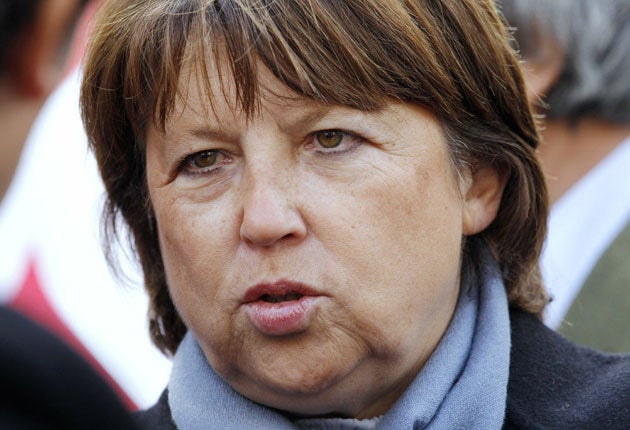Is France ready for a woman at the top (even if she is the daughter of Delors)?

Martine Aubry, whose father is the veteran French politician Jacques Delors, will this week accept the bruising challenge that Mr Delors refused 17 years ago and declare that she wants to be President of France.
Ms Aubry, 60, Socialist party leader, mayor of Lille and mother of the 35 hour working week, will try to succeed where Ségolène Royal failed last time and become the first woman to be a French head of state since the 16th century.
First, she must win her party’s nomination in an unprecedented “open primary” election in October. Predictions for the Socialist race were scrambled last month by the arrest on rape charges in New York of the long-time, but undeclared, front-runner, Dominique Strauss-Kahn.
The new opinion-poll favourite is the former party leader, François Hollande, 56, but Ms Aubry has been reducing the gap in recent days. She is expected to announce her candidature at a cultural centre in Lille today, when the Socialist primary race officially opens.
President Nicolas Sarkozy has been cheering her on from the side-lines. According to leaks from the Elysée Palace, he thinks that he would easily defeat Ms Aubry in the two round election next April and May, despite persistently disastrous polls which suggest that he may even lose to the far right leader, Marine Le Pen, in the first round.
The former employment minister, strongly identified with her creation of a 35 hour working week in the late 1990s, is dismissed by Mr Sarkozy as a drab leftist with no charisma and little stomach for a ten-month-long election campaign. Ms Aubry’s friends in the Parti Socialiste are also doubtful about her mental strength and stamina but say that she may prove to be a tougher, wittier and more charismatic candidate than many pundits realise. Ms Aubry was asked last week what distinguished her from the elegant but brittle Ms Royal, who lost to Mr Sarkozy in the second round in 2007. Ms Aubry shot back: “I am a brunette, Ségolène is a blonde.” Both women are brunettes.
Ms Aubry’s father, the former European Commission President Jacques Delors, had been widely expected to seek the Socialist presidential nomination in 1995. He disappointed, and angered, many of his supporters by announcing on television in December 1994 that he would not run for personal reasons.
Ms Aubry seems to have gone through similar soul-searching since Mr Strauss-Kahn’s likely candidature crashed and burned last month. She and “DSK” had agreed not to run against each other in the primary. Until his arrest, Ms Aubry had been expected to give way for the IMF chief, who was the runaway favourite in both the primary and presidential polls.
Friends suggest that that the Socialist party leader was extremely reluctant to enter what seems certain to be a vicious primary and presidential campaign. According to leaks to the French press, she broke down in tears on one occasion when leading supporters told her she had no choice.
Although the new Socialist front-runner, Mr Hollande, is popular in the country and with grass-roots party members, he is detested by the other so-called “elephants”, or party barons, including Ms Aubry.
Although there are several other candidates, including Ms Royal, the primary, on 9 and 16 October, is now expected to come down to a duel between Ms Aubry and Mr Hollande. Neither is a “Gallic Tony Blair”. Neither is blessed with obvious charisma. Neither claims to have found a way of re-inventing centre-left politics for the early 21st century. Both are expected to try to make a virtue of their reliability, sincerity, experience and competence – even their dullness – compared to the unpredictable, frenetic, bling-bling presidency of Mr Sarkozy.
For the first time, the Parti Socialiste has thrown its choice open to all French voters who are willing to pay a minimum of Euros 1 and sign a declaration that they share left-wing values. The “openness” of the primary may favour Ms Aubry.
Mr Hollande is marginally more popular with Socialist party members. Polls suggest that he would appeal to centrist voters and therefore be a stronger candidate in the election proper. But Ms Aubry is more acceptable to the voters of the “wider left” who have been invited to take part in the Socialist primary in October.
Join our commenting forum
Join thought-provoking conversations, follow other Independent readers and see their replies
Comments